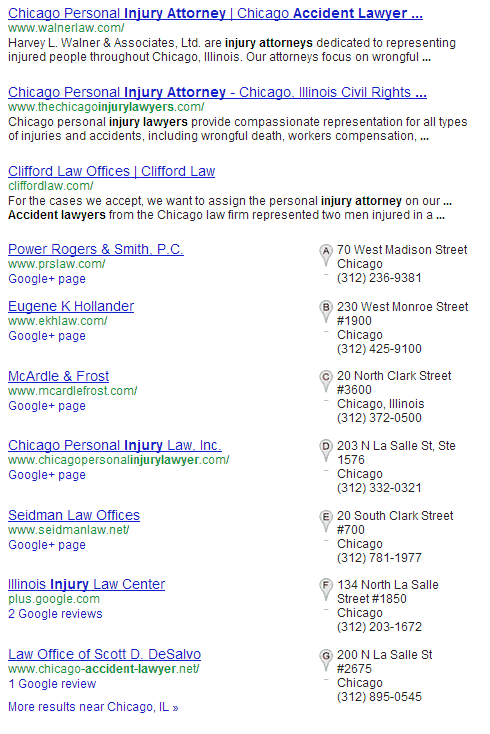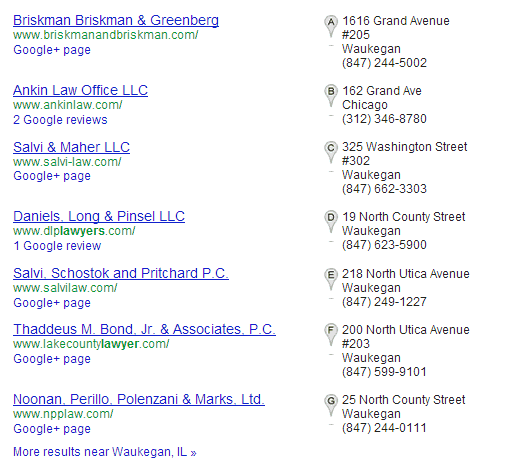Search engines, and more specifically Google, strive to deliver results that are the most relevant for a user's search. And one of the factors that is relevant to a large number of searches is location.
Let's use a legal services search example. If a user searches for a law firm, in many instances, they may want to find one near them. In order to deliver results that have a location component, search engines use location-based customization. In other words, they tailor relevant results base upon the location of the searcher.
Google uses an auto-detected location for users based upon the following:
There are varying reports of the accuracy of the use of IP addresses for determining location. Nonetheless, if your target audiences (prospective clients) look for you locally, you need to think about how location-based results might impact your visibility.
Of course, IP address isn't the only factor that Google uses to deliver location-based results. In fact, merely changing the location setting on a result page can have a huge impact on the results.
Let's look at a specific example. Here's a search for the term [injury lawyers] with my location set to Chicago, IL:

As you can see, Google is doing a pretty nice job of serving up relevant results that include various injury law firms located in Chicago.
Now let's look at this same search for [injury lawyers] when my browser's location is set for Waukegan, IL:

A much different set of results. And as you might suspect, the results include injury attorneys located in Waukegan.
Naturally, the questions becomes, how do I optimized for local search for my target audience?
Here are some tips:
While you can influence some local search ranking factors, there are others that are more difficult to change. Here are David Mihm's top 5 local search ranking factors:
1. Physical Address in City of Search
2. Proper Category Associations
3. Proximity of Address to Centroid
4. Domain Authority of Website
5. Quantity of Structured Citations (IYPs, Data Aggregators)
While you can update your category associations, domain authority and citations fairly easily, it's going to prove much more challenging to change your firm's physical address and distance to the centroid.
While you might be tempted to "game" local search results to get visibility in larger markets, it's not worth it. You're more likely to harm your local search visibility than to gain some perceived advantage.
Follow the Google Places Quality Guidelines. Focus on the ranking factors that you can actually influence. Track you local search results.

Over the years, law firm prospects have sent us reports from just about all of our competitors. Unfortunately, even today, some law firm marketing agencies still mislead their clients via "reporting." One particularly egregious example comes in the form of ranking reports. Which prompted this LinkedIn post. To my surprise, I received a lot of […]
John Wanamaker supposedly said "Half the money I spend on advertising is wasted; the trouble is I don't know which half." In an an effort to figure out "what half is working," attribution was born. Coupled with a transition from traditional, offline ads to digital media, attribution became the holy grail for analyzing advertising spends. But […]
I recently asked ChatGPT, "What are some of the top personal injury law firms in Chicago?? Actually, first I ask "who are some of the top personal injury lawyers in Chicago?" ChatGPT couldn't handle that one, so I modified the prompt. ChatGPT listed five very well-known firms downtown. Can you guess the other four? That's […]
If you're like me, you have some degree of AI, ChatGBT, Bard, exhaustion. Now don't get me wrong, this is stuff is remarkable and is changing, well, a lot. But before you hook up the ChatGPT API to your WordPress API and crank out 10,000 pages, here are a few things to think about. Let's […]
If you know me, you know my opinions about links and SEO advice from Google. If you don't, here's the TL;DR: Meh, links! Meaning, all things being equal, links still remain a competitive difference maker for ranking. Take Google's SEO advice with several grains of salt. Google has no economic incentive to help your site […]
The best marketing advice I can give you is to be authentic. Of course, you don't find that very helpful in terms of meeting your growth goals. So, you might decide to game the system. As I'm writing this, one of the more popular ways to gain the system is to pay for engagement. This […]
The following post was written by ChatGPT. ChatGPT, developed by OpenAI, is a state-of-the-art language model that can generate human-like text based on a given prompt or context. This technology has the potential to revolutionize the way that businesses, including law firms, market themselves to potential clients. One way that a law firm could use […]
How long does SEO take? When can I expect to see results? What results should I expect to see? These are all reasonable questions that we field from lawyers every day. And, like many legal answers, the answer is: It depends. Yes, I know that's not the answer you wanted. But it's the most honest […]
And how much time should they spend doing it? I recently had the privilege of chatting with Tyson, Jim, and Conrad for an upcoming episode of The Maximum Lawyer Podcast. If you're not familiar with The Maximum Lawyer community, you should definitely check it out. Jim asked a really great question about who should do […]